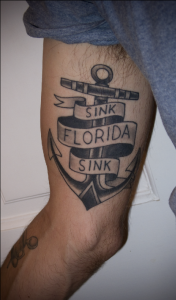Tao Lin Reading + Q&A + Minireview
Tao Lin reads from the first section of Shoplifting from American Apparel, then answers questions about writing process, influence, shoplifting, etc.
I read and greatly enjoyed this novella a couple weeks ago. It makes some interesting use of what people who want to put tags on things could call verbal minimalism inherting cinéma vérité, as well as a mash of Andys (Warhol and Kaufman), new uses of internet language in print, and a linear-alinear timeline modeling that more correctly models everyday life than most textual attempts at representing everyday life. That’s if you want to put tags on things.
I’d prefer to just say that I laughed more at parts of this book than I’ve laughed in a long time, and I think those who see this book as ‘incomplete’ might be missing part of the point here, which is not to exploit the expectations of Tao Lin’s previous work while also not exploit some kind of forced shifting of an artist’s tone. Like many artists who are ahead of the curve, this book is ahead of a curve that you might not yet see curving, particularly because it most succeeds on the level of entertaining the reader while being ahead of the curve, which then most easily becomes mistaken as unfocused, when in fact it is the extreme opposite: focused beyond focus.
I really enjoyed this book.
You can buy it here.
GIANT REVIEW, special gchat collaborative edition: Shoplifting from American Apparel
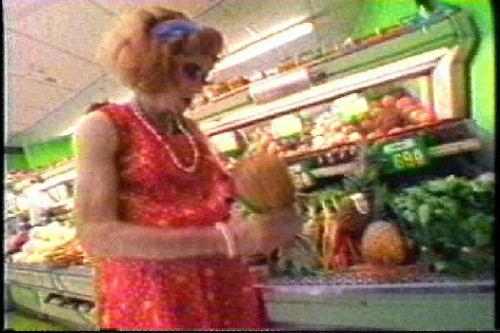
Drew Toal and I were having such a great time talking about Tao Lin’s new novella, Shoplifting from American Apparel, that we figured we owed it to the world to go public. So we forced ourselves to not discuss the book anymore until we were both finished, then we scheduled a time to meet up online and gchat about it. We ended up talking about a lot of extra-literary stuff (maybe too much?) but given that it’s Tao, and that we know him, that was pretty much unavoidable squared, but I think we did a pretty kickass job with the book when we got around to it. Drew was at his office, in mid-town, and I was at my office, in my bedroom. After the jump, we get down to it.
Tao Lin’s ‘Shoplifting From American Apparel’
Really excited about this one, releasing September 15th from Melville House.
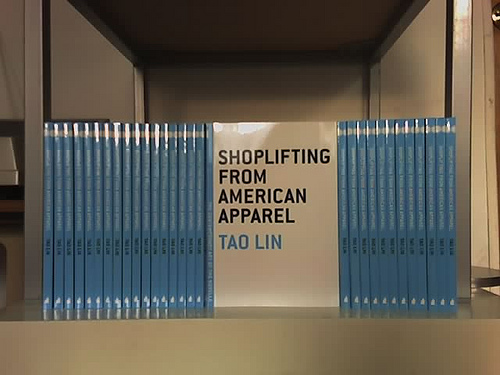
Set mostly in Manhattan—although also featuring Atlantic City, Brooklyn, GMail Chat, and Gainsville, Florida—this autobiographical novella, spanning two years in the life of a young writer with a cultish following, has been described by the author as “A shoplifting book about vague relationships,” “2 parts shoplifting arrest, 5 parts vague relationship issues,” and “An ultimately life-affirming book about how the unidirectional nature of time renders everything beautiful and sad.”
From VIP rooms in “hip” New York City clubs to central booking in Chinatown, from New York University’s Bobst Library to a bus in someone’s backyard in a college-town in Florida, from Bret Easton Ellis to Lorrie Moore, and from Moby to Ghost Mice, it explores class, culture, and the arts in all their American forms through the funny, journalistic, and existentially-minded narrative of someone trying to both “not be a bad person” and “find some kind of happiness or something,” while he is driven by his failures and successes at managing his art, morals, finances, relationships, loneliness, confusion, boredom, future, and depression.
The Brandon Book Crisis: A review
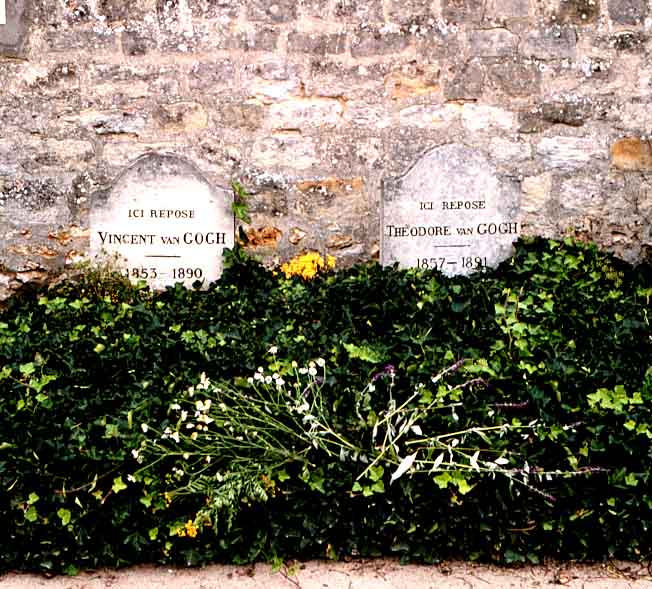
The Brandon Book Crisis (Muumuu House, 2009) by Brandon Scott Gorrell and Tao Lin
A paperback “thriller” about book design published May 25, 2009 in a limited edition of 150 numbered copies. 152 pages, 5.5″ x 7″, © Creative Commons, No Rights Reserved. Features 140+ pages of unedited Gmail chats, text messages, voicemails, and emails between Brandon Scott Gorrell, Tao Lin, and others.
The Brandon Book Crisis is, put simply, a book about the making of a book, which is not an entirely new postmodern conceit, if one thinks about the self-referential Pale Fire (Nabokov), Coming Soon! (John Barthes), or Lunar Park (Bret Easton Ellis), to name a few. ‘Edited,’ or rather, compiled by Brandon Scott Gorrell and Tao Lin, it consists of gmail chats (already aestheticized by Muumuu House), emails, and the occasional frantic text concerning the printing of Brandon Scott Gorrell’s During my nervous breakdown I want to have a biographer present — specifically, its fonts, colors, and unworkable files.
3 Interviews for Tuesday

At Writers Digest, Robert Lee Brewer talks to Justin Marks about his first book, A Million in Prizes, which won the New Issues prize and which is out now.
One of the things a book is to me is in some ways a chart of a person’s development/growth as a writer during the time in which the book was written.
At Jezebel, Anna is talking to Feministing.com’s Jessica Valenti, whose new book, The Purity Myth: How America’s Obsession with Virginity is Hurting Young Women, came out just last month.
After all, how is it not focusing on young women’s sexuality by talking constantly about their virginity or bringing them to purity balls? If you are telling young women over and over that what’s most important is their virginity, that what makes them valuable is their chastity – then you’re sending the message that it’s the body and sexuality that defines who they are.
And Emily Nonko talks to Tao over at the Bomb magazine website.
The next two books are completely autobiographical. I just think about the most interesting parts of last two years. And then for the ending, I just ask: does it work?
The Circle is Now Unbroken

You knew this day would come. As anyone who has ever watched a serial TV drama knows, epic feuds are always bound to reverse into epic loves, because the same engine–passion–is what drives them both and draws the players inexorably to one another. Shall we recap for the latecomers?
Literary Doppelgangers: Quartet
MICHEL FOUCAULT & CHRISTOPHER LLOYD
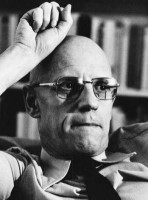

Michel Foucault tells us of The Order of Things, which is pretty simple: Back to the Future, Back to the Future II, and Back to the Future III. Jeez, that was easy. Call me a philistine, but I’ll pick those movies any day over freakin’ semiotics. Up until this post, I thought that photo of Lloyd was a Ron Mueck sculpture. In the age of mimesis, everything is suspect.
Cover to Cover: NOON, Part 3

(Previous entries in this series: Part 2, Part 1.)
It’s been a long couple of weeks for me, slogging toward the end of my teaching semester. I’m coming to you live right now from the basement of Murray Hall, New Brunswick NJ, for probably the last time until September. It’s a nice little office, as windowless cold rooms go, but I can’t say I’ll be sorry to be apart from it all summer. Anyway. Yesterday I finished grading my students’ last homework papers, and in a half hour I give them their final, which I spend all of tonight and tomorrow grading, so I can be done by Wednesday. What does all this mean? It means that I had a bit of time this morning to actually read something that wasn’t student work. So I whipped out my copy of NOON, uncapped my Krispy Kreme coffee, settled into my window seat, and picked up where I left off.
May 5th, 2009 / 1:44 pm
EXCERPT: from Ellen Kennedy’s Sometimes My Heart Pushes My Ribs (#1)
Florida
i had a dream last night about your parents and you
in your house in florida
your parents were dancing in the garage
and your mom was singing
and then the radio stopped for no reason
and she screamed ‘no’
and then walked away
your dad was pissed
then you went into your room and your computer had this program that you could make animations with
and you made like 5 videos of your dad
changing from a happy dad
to a pissed dad
then i woke up
your parents were dancing so hard
Tao Lin wins Cave Canem First Book Prize & I talk to Prize Judge Yusef Komunyakaa

********UPDATE: APRIL FOOLS’********
The announcement isn’t up on their site yet, but after I heard from the source himself, I called Yusef Komunyakaa–who is judging the contest this year–and asked for clarification. “I wish you wouldn’t post about this conversation,” Komunyakaa said, “but I’m not telling you that you can’t. Anyway, if you don’t break the story, one of our interns–or Tao’s–is probably going to.”
Here’s a bit of info about the Cave Canem prize:
Established in 1999, this first book award is dedicated to the discovery of exceptional manuscripts by African American poets. The participation of distinguished judges and prominent literary presses has made this prize highly competitive.
As you can see, this is an incredibly audacious choice for Komunyakaa and Cave Canem to have made, since Tao Lin is neither a first-book author or an African American. “We thought about that,” Komunyakaa told me, “but after last year, when the judge declined to even award the prize, I thought it was time to shake things up. If Tao Lin had the courage to unironically enter a contest for which he was entirely unqualified at every conceivable level, then maybe we should try and reward that courage, as a message to other young African American writers out there.”
I asked Komunyakka if it had occurred to him that perhaps Lin’s entry was not, in fact, unironic at all. “Yes, that did occur to me,” he said. “Some people on the Graywolf board were especially concerned about this, but I finally just said, ‘Listen, what does it matter? A good book is a good book, and this kid’s stuff actually sells.’ It’s the name of our prize–and your press–that will be on the cover of his book, which we expect he will promote with the same machine-like relentlessness that is his trademark–which of course is how he ended up entering our contest in the first place. I said to them, ‘you want to see Cold-Pressed Organic Virgin Coconut Oil come out with that little Melville House logo on the spine instead of your wolves, be my guest. But this is the book I’m writing an introduction for.’
I’m a little baffled by all this, but I have to go start preparing for teaching this afternoon, so I can’t really give this thing the attention it deserves, but anyway, congrats, I guess.
Previous winners of the Cave Canem Prize include Major Jackson, Natasha Tretheway, and Tracy K. Smith. Tao Lin finds himself, as usual, in good company.

